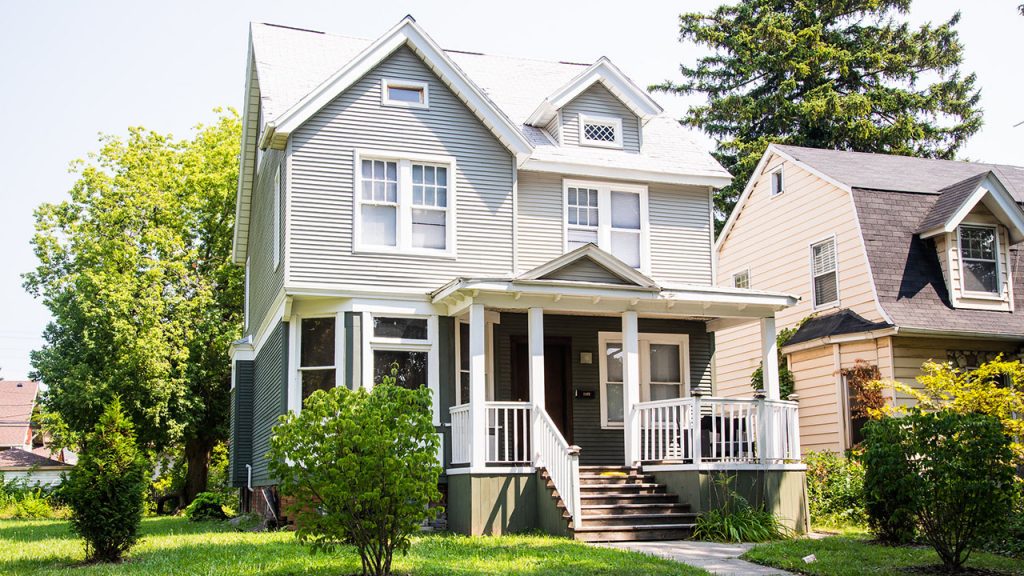Overtaxation is top of mind for Detroit homeowners as property values rise
More than 600 people participated in an online public forum to discuss reparations for Detroit residents affected by overassessments on their property taxes.

Last weekend, more than 600 people participated in an online public forum to discuss reparations for Detroit residents affected by overassessments on their property taxes. Sonja Bonnet was a keynote speaker.
“I lost my home due to illegal and unconstitutional tax foreclosure,” Bonnet told the group. “Today I want to speak to the community just to let you know that I’m proof that your voice can be heard.”
Before she lost her home, Bonnet could have qualified for tax exemptions because she was poor, which would have minimized what she owed to the government.
I think that the city really needs to know that when you put the community in these positions, you’re not just taking a building from us. You’re taking the American Dream from us.” —Sonja Bonnet
“But nobody told me about that program. And even while I was going through foreclosure and went to the city buildings and other community resources, nobody told me about it,” Bonnet said.
For Bonnet, tax foreclosure was more than just losing her home.
“I lost my health. I lost my footing. I lost confidence in myself,” Bonnet said. “I think that the city really needs to know that when you put the community in these positions, you’re not just taking a building from us. You’re taking the American Dream from us.”
Compensation for overtaxed Detroit homeowners has been a fraught political item. About one in three Detroit homes have fallen into foreclosure since 2009 — some by banks and mortgage lenders, others by Wayne County for unpaid taxes. Some of those foreclosures occurred on homes that were overvalued by city assessors. Many housing activists cite a Detroit News report that puts the overtaxation figure at $600 million.
In 2014, Mayor Mike Duggan announced across the board cuts on residential assessments. The Duggan administration put forward a resolution to offer some restitution for overtaxed residents in 2020, but critics say it did not go far enough, and the measure was voted down by City Council.
This year, a new slate of public officials came to office pledging to make property tax compensation a priority. Newly elected City Council President Mary Sheffield co-hosted the event.
“Let’s get united around this issue. Let’s continue to use and elevate our voices,” said Sheffield. “I’m looking forward to a sound piece of legislation that we collectively as a council can move forward to advance this issue.”
Sheffield organized the public forum with the Coalition for Property Tax Justice, which studied how city assessors evaluated properties following the Great Recession. They found most homes in Detroit were overassessed in violation of the Michigan state constitution, with poorer residents bearing the brunt of inflated property values.
“The lower-valued homes are taxed at a higher rate than the higher-valued homes,” said Bernadette Atuahene, a professor at the Chicago-Kent College of Law who leads the Coalition for Property Tax Justice. “In Detroit, property tax assessments are highly regressive.”
While Detroit reappraised all its homes in 2017, the coalition claims overtaxation persists. Atuahene says the city needs a robust plan for “dignity restoration” that accounts for the damages of structural racism in housing and land ownership.
“Black and Hispanic homeowners pay on average 10 to 13% more in property taxes for the same bundle as goods as whites,” Atuahene says. “This is not just a Detroit issue. This is not just a Michigan issue. This is a national racial justice issue.”
During the public forum, participants divided into groups to discuss potential compensation plans, like home repair grants, property tax credits and cash payments.
“I have no business telling anybody who was overtaxed or who was disposed what they should get. They need to exercise their agency and tell us what they want,” Atuahene said.
Some of those options have already been scrutinized by city attorneys, who ruled against giving monetary restitution to the overtaxed. Still, Sheffield is making new strides on the issue, asking the city’s Law Department to revisit a potential resolution, while she drafts a new ordinance with community input. The move has the backing of one of Detroit’s members in Congress.

“The compensation ordinance is a key pathway to restoring dignity for so many of our neighbors in Detroit,” said Rep. Rashida Tlaib (D-Detroit). “We’re done settling. No more hypothetical benefits. No more crumbs. This time, we’re coming for everything Detroiters deserve.”
Many members of Detroit City Council campaigned to support property tax justice during last year’s elections. Housing advocates say they could start with creating an independent review board that studies property tax inequities. Then, they can order the city to stop sending owner-occupied homes to foreclosure when they’ve been overassessed.
In the meantime, property values in Detroit are going up. According to housing officials, residential properties in the city are worth $2 billion more in 2021 than they were in 2017, as most homes see their assessed values rise for a fifth straight year. Duggan says on average, each neighborhood saw a 30% increase and claims of overtaxation are “absolute nonsense.”
“Certainly, home sales have increased, though I don’t know about this last year with COVID. We’ve seen more mortgages, more home repairs, we’ve seen a lot of positive things,” said Duggan. “I don’t think there’s any question that when you demolish 17,000 burned-out homes and you renovate 8,000 vacant homes and move families in, that has a huge effect.”
City officials say while the assessed value of homes are going up, state law stipulates that individual tax increases are tied to inflation and capped at 3%.
“No one is being overtaxed,” said Detroit Assessor Alvin Horhn. “This run of increased assessment, this run of increased market value is not leading to a run in increased taxes.”
The Coalition for Property Tax Justice estimates many Detroiters are paying inflated taxes because of inaccurate property assessments to begin with, even if yearly tax increases are limited. But that figure is still uncertain for pandemic years.
“We don’t have our hands on that data yet,” said Atuahene in response to the announcement. “We’re looking forward to getting our hands on the data so that we can do an assessment ratio study to see, did they finally get it right?”
More than 400,000 property owners will get their new assessments in the mail starting this month. They’ll have until Feb. 22 to appeal their new property values. If that first appeal does not work out, they can go before the Detroit Board of Review in March.
Trusted, accurate, up-to-date.
WDET strives to make our journalism accessible to everyone. As a public media institution, we maintain our journalistic integrity through independent support from readers like you. If you value WDET as your source of news, music and conversation, please make a gift today.
